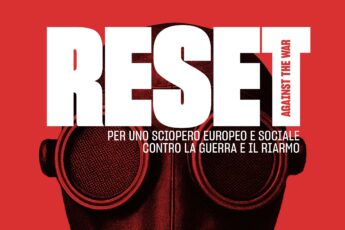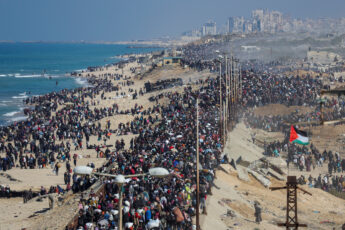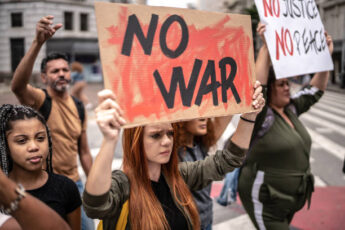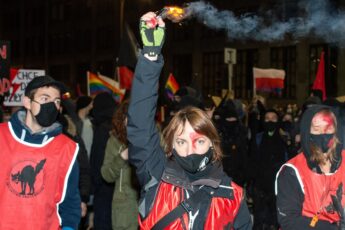
Right after the invasion of Ukraine, the TSS Platform published a statement titled No to War. For a Transnational Politics of Peace, which had a wide circulation. Its diffusion in Europe, from East to West, in the United States and Latin America has led to the creation of the Permanent Assembly Against War, a transnational space for discussion and organization not only to oppose the war, but to practice a politics that takes the side of those affected by the war in Ukraine, those in Russia who oppose the war, and all those who struggle not to be killed, exploited, and oppressed and who will suffer the consequences of the war on their living and working conditions. In order to support and give visibility to this process of organization and communication, we have opened a multi-voiced debate on what expectations the prospect of a transnational politics of peace raises, what its contents can or should be, what the obstacles to its realization are, and the plans for connections and actions that make it possible. The result is a first series of interviews with scholars and comrades who in recent years have contributed to the movement’s debate on issues, discourses and practices that a transnational politics of peace cannot ignore. After the interviews with Jeremy Brecher (United States), Ida Dominijanni (Italy), and Sasha from Feminist Anti-War Movement (Russia), we publish today an interview with Ranabir Samaddar (India).
Ranabir Samaddar is a political philosopher based in Kolkata, India. Currently he is the distinguished chair in migration and forced migration studies at the Calcutta Research Group. He has worked extensively on migration, the theory and practice of dialogue, nationalism, post-colonial statehood in South Asia and new regimes of labour and capital accumulation. Among his many publications we find Karl Marx and the Postcolonial Age (2017), The Materiality of Politics (2007) and Politics of Dialogue. Living Under Geopolitical Histories of War and Peace (2004). He is a regular columnist in Indian national newspapers and he is part of dense political debates linking South Asia and Europe. This interview widens the debate on war towards a global understanding of what is at stake in the building of a transnational politics of peace against the politics of war in present times. Against any seamless idea of politics, Ranabir addresses the contentious nature of peace, neutrality and justice, the cracks in Europe, the function of NATO, the new forms of globalization and the need of a politics of social transformation in the construction of peace.
***
A transnational politics of peace wants to be something more than international solidarity. It has the claim to build transnational connections that, while saying no to war, at the same time contest its effects on the living and working conditions of millions of women and men, LGBTQIA+ people, workers, poor, migrants and non-migrants, not only in Ukraine and Russia. Do you think this claim is realistic, or do you think we should prioritize positioning over the reconfiguration of the geopolitical framework?
A transnational politics of peace cannot be a seamless idea of politics. It has to recognize the fault lines within “peace politics”, the contentious nature of the peace question today. Thus, I may begin by asking, what does a European war mean for non-Europeans? You speak [in the report from the first gathering of the Permanent Assembly Against the War] of the necessity of not being neutral, but what about the right to remain neutral, not to take side in a war? Is this not the historic right of the smaller nations, smaller peoples to remained non-aligned? This is what the decolonized countries of the world in the fifties to seventies in the last century had proclaimed in the context of cold war when the Americans and the imperialist West put the demand on the rest of the world that the latter has to take side. I know we shall say that we are on the side of the victims and oppressed classes. But this is too general a statement. We require concrete analysis of a concrete situation. There is no “just war” here, and we are resolutely on the side of peace. To craft peace politics in that contingent situation, the first requirement is to refuse to take sides and resist the pressure to take a side.
I also notice NATO is mentioned only in passing in the statement forwarded to me. But a transnational politics of peace first must declare itself against the imperialist politics of transnational military alliances. Why should we at all require NATO? What has the postcolonial world have to do with NATO? Can one tell me why does Europe require NATO? Who gave NATO the power to bomb Serbia or Libya or come to Afghanistan? In the global South we do not find such kind of continental military alliance and security apparatus. Also, is anything western necessarily global? We have to think of these – that is to learn to appreciate and include non-European ways of looking at the questions of war and peace – if we seriously want to work on a transnational politics of peace.
A permanent assembly of peace is a very good idea. I support it. But for that a wider understanding of what is at stake in the neoliberal time is needed. Equally importantly, there is much to learn from the global peace movements in the fifties and sixties. Remember the contributions of the African and Asian voices to a global peace movement. There was also the Tri-continental peace movement.
European states and the US are trying to present themselves as the champions of a democratic internationalism against the advance of Putin’s authoritarianism. The violence of the European border regime and neoliberal capitalism with its devastating effects especially in Central and Eastern Europe seems to be erased. The appeal of Western governments to democratic values, far from indicating a commitment to the enlargement of social or civil rights is merely functional to the hardening of opposing war fronts. A transnational politics of peace cannot be exhausted only in the necessary request for the end of hostilities or in the call for democracy. How can we articulate a discourse that considers these contradictions within and beyond the war?
The radical theory and politics of “enlargement of social and civil rights” as the fulcrum of an agenda of social transformation has proved to be a cog in the wheel of the neoliberal corporate machine and the last thirty years of European enlargement have shown that. The so-called enlargement of social and civil rights cannot prevent the enlargement of the military machine. The two have gone together. The Greek financial crisis, the imposition of the rule of the Troika, and the collapse of the Greek Left that surrendered the national sovereignty of Greece to corporate pressure should have alerted us to the necessity of fighting the hard but crucial battle against corporate rule, militarism, and neoliberal expansion. I have often wondered why the movements for enlargement of social and civil rights in Spain, Greece, and elsewhere did not oppose NATO and demand that their respective countries should opt out of NATO.
In this context, we have to take note of the double nature of the national question. In Eastern Europe – Poland, Ukraine, and elsewhere – the nationalists in the past had collaborated with the Nazis in annihilating the Jews, other minorities, the workers, and the socialists and communists. These nationalists were the forces propping up the reactionary rule of the wealthy, monarchists, landlords, militarists, and the bourgeoisie. Many of these collaborators were saved by the Americans, the British, and the Church. Remember the Ratlines? The entire scenario was like that of the Ratlines. These nationalists came back to power almost everywhere after 1989. They wanted to join “Europe” as that would seal the alliance between the corporate rule of Europe and right-wing nationalism in Eastern Europe. On the other hand, the nation question is not over in Europe. By sacrificing the nation’s right to fight for its people in the name of an elusive agenda of social and civil rights, the New Left in these countries has handed over the flag of national resistance to domination and imperialism to the Right.
A transnational politics of peace cannot forget the reality of war and assume that it will be still a politics of peace. Peace demands today security of nations, new principles of peaceful co-existence, shunning of military alliances, and dialogic justice. Expansion of social and civil rights will be embedded in this context. Undermining of security of nations in the neoliberal time will lead to hydra-headed war. Therefore, we must be honest. Are we responding with the same urgency to the crisis in Afghanistan, Saudi bombing in Yemen, or NATO bombing on Libya? We have to formulate the principles of dialogic peace.
Someone argued that this war marks the end of globalization. What do you think will be the long-term transformations of this war that transnational peace politics must prepare for?
I think that the reality of globalization will be starker, by which I mean the reality of its uneven nature, multiple competing and collaborating forms, centres, and consequences. In a way it is good because we had become accustomed to treating globalization in a centralist model. There was only one world. That model is on its way out perhaps sooner than we anticipated. Surely, the Euro-American model of globalization is over. Nations, peoples, and countries will claim the right to globalize in their own ways. Legal pluralism, currency pluralism, pluralism of trade regime – all these will soon require a global dialogic order. Perhaps this will be a kind of daily dialogue, much in the style of “daily plebiscite” of the ancient time. The sanctions regime brings out the harsher, coercive face of globalization as we find it today. But, sanctions will hasten the way to multiple currency regimes. I recall in the seventies of the last century when India and the USSR had rupee-ruble agreement in bilateral trade.
From Ukraine, critical voices have been raised against a part of the Western left, which has ignored over the years what was happening in the East and now reads the situation in the framework of anti-American anti-imperialism or democratic Europeanism, with lenses and positions that are no longer suitable to the present. What does this war force us to see and what patterns and models do they force us to abandon?
I am not in contact with the “critical voices” in Ukraine you refer to. I am sure, Left, critical, revolutionary voices are there. However, since I have no knowledge of them, I cannot comment on that. But I can assume that voices that ignore NATO, the worldwide domination of the US, the suppression of Palestine, US-EU hegemony, that ignore the crucial agenda of struggle for social transformation, and think of only Russian domination, may be nationalist, but not critical. Remember, movements for expanding social and civil rights can sit well with an overall liberal agenda as recent experiences of Spain and elsewhere have shown. So, we have to ask, what is “critical” here? All this however does not mean that Russian intervention is to be supported. Yet to be selectively nationalist as many New Left activists in Eastern Europe have been is intriguing. I firmly hold that a Leninist policy of “no” to war and “yes” to dialogue, ceasefire, and peace will be the first mark of any criticality now.
The war in Ukraine is a patriarchal war. It is reaffirming with bombs all the hierarchies that we contest. Men must be soldiers and show by fighting that they are true patriotic males. Women are treated as weak and powerless objects of protection, and the hundreds of thousands of migrants fleeing Ukraine will most likely be employed as a devalued labour force in essential sectors or in domestic work. How do you think a transnational politics of peace can challenge patriarchal and sexual hierarchies that the war is strengthening?
A transnational politics of peace has to fight against the fault lines in a protection regime. If you mean that, I agree with it. However, you say, males are soldiers, they are fighting. It is more than that. Men are compelled to stay back and fight while women, old people, and children are allowed to leave. If this is true, this is then a form of conscription (forcing people to fight) that will be now known as “people’s war”. I could have talked in details about the practice of “human shield” on which much is being written by peace researchers and activists now. But this is not the occasion to discuss that.
There are severe cracks in the humanitarian glass. For instance, guest students from Africa and Asia have faced and are facing enormous discrimination in leaving Ukraine and getting protection in Poland, Moldova, Romania, and elsewhere. The day Spain declared its “open arms” to Ukrainian refugees the mass media splashed a picture of security personnel beating up a group of bare bodied migrants from Africa on the street of Madrid. Ukrainian refugees are welcome because they are “within Europe”, while migrants and refugees from “outside Europe” are shut off. One has to take notice, how all social levels and forms are being weaponized now in this war. Sanctions weaponize life conditions of common Russians, as they did in the case of common people of Iraq and Iran or North Korea. Likewise, the life conditions of millions of people in the world and the economic conditions of poor countries importing oil have been weaponized. Refugee protection policies too have been weaponized.
A transnational politics of peace has to advocate justice at all levels, though at times minimally. The politics of peace has to articulate what I called long back minimal justice. What will be the principles of minimal justice in this context? Peace and reconciliation can be achieved on the basis of minimal justice. This is what can be called “dialogic justice”. This would include among others raising voices for resumption of dialogue towards immediate ceasefire and an eventual peace pact between Ukraine and Russia, complete withdrawal of NATO from the “borders of Europe” and elsewhere, outlawing NATO from taking any interventionist step outside the “North Atlantic”, respect for territorial integrity of states including Ukraine, a new world security forum, full rights to minorities, and complete non-intervention of the “Troika” in Eastern Europe. Only with the historic recognition of the fault lines in the existing security framework that came in the wake of 1989 in Europe and elsewhere with new coercive trade and financial rules in place, we can take steps towards creating peaceful conditions for real enjoyment of civil and social rights. Such historic recognition would mean, for instance, recognizing NATO’s admission of guilt in the breaking up of Yugoslavia – Europe’s collective guilt in expropriating that country – and EU’s guilt in subverting Greece’s sovereignty in 2015, and all that Europe has done to countries outside Europe, say Libya. This is what a transnational politics of peace means and a permanent assembly of peace will symbolize. It must uphold principles of dialogue over coercion and war – not selectively, but universally.
The transnational politics of peace must act in the short term, in the face of the urgency of the war, but it must also be able to give itself an autonomous, longer-term perspective. How do you think these two dimensions can be combined?
The “but” used in the question is insidious. Two reasons: One, the short term facilitates the long term. They are not the same, but they are complementary. Two, and this is more important, what kind of long-term perspective is this that ignores the reality of war, conflict, and the demands of social transformation? Shall we make this remark in the context of say Afghanistan, Syria, or the Philippines, or Yemen?
War is a postcolonial reality. European Left could ignore it as it never imagined that war would re-appear in Europe. Do not say it was unannounced, Europe ignored the signs. War is a reality in the history of social transformation.
A politics of peace gains its salience because it acknowledges this reality and develops on the basis of the contradictions within this scenario of war. With the slogan of peace (along with land and bread) the Bolsheviks made the revolution. Is this history ancient? Therefore, I do not know what is meant by autonomous here. Does it mean autonomous from social realities, from the reality of war? Politics of social transformation is based on acknowledging social realities and “bending the reality” to the goal of transformation.





